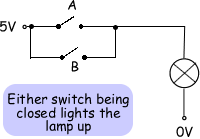    |
||||||||||||||||

|
||||||||||||||||
|
For the output Y to be high (a logic state 1) either input A OR input B needs to be high. As long as at least one of them is high the output will be high. (Compare with the XOR) The truth table below shows that this is the case:
n-input gate You can have any number of input lines into a gate. To get a high output any one (or more than one) of the inputs has to be high. Boolean Expression for the OR gate: Y = A + BSwitch circuit equivalent To help you understand what an OR gate does we can consider a simple electrical circuit. When the switch is open the state of the gate input can be thought of as being low (0), when it is closed the gate input can be thought of as being high (1). When the lamp lights up the output state is high (1) and when it is unlit the state is low(0).
As this is a parallel circuit either or both switches being closed will light up the lamp. |
||||||||||||||||
 |
||||||||||||||||

 The 'OR' gate
The 'OR' gate

